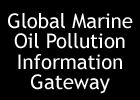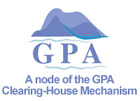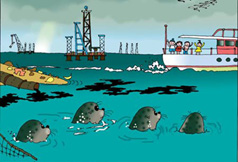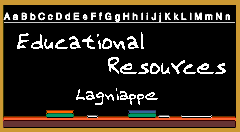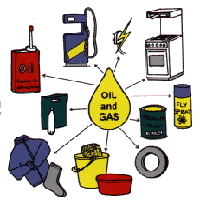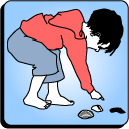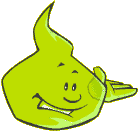Gulum,
Children's Ecological Organization, in Baku, Azerbaijan, and
the ECO Institute in Omaha, Nebraska, U.S., have collaborated
on a project to start an early childhood environmental education
class in Baku. For the past four years, Gulum has involved kindergarten
teachers and pre-school children to raise awareness of the need
to protect the Kura River and the Caspian Sea from pollution.
Several publications, including lessons for teachers and children's
books, have been produced, classes for children and workshops
for teachers have been held. Also, there has been a "mobile
museum" and a video about the Caspian Sea for children
living around the sea. See also ISAR,
the Initiative for Social Action and Renewal in Eurasia.
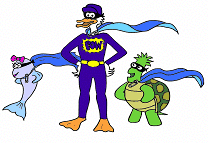
"Water
pollution can come from a lot of different places, but the number
one reason that our creeks, rivers, lakes and beaches get dirty
is from the water and other pollutants that flow into storm
drains. " Kids' pages by the City of Oceanside Clean Water
programme,, with lots of illustrations, about storm
water and marine pollution (marine litter, oils etc.).
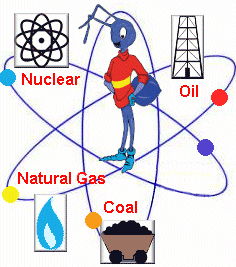
The
Energy Ant
guides kids into the world of non-renewable and renewable
energy (U.S. Energy Information Agency). These pages give
information on what energy is and , as well as fun facts,
energy quiz, classroom connection, kids' corner and much more.
The
U.S. Environmental Protection Agency (EPA) has a section
for kids about non-point source pollution. Darby
Duck and the Aquatic Crusaders teach children about
oil and how to clean up an oil spill. On
"What's
wrong with this picture?" one finds everyday activities
that should be avoided in order to minimize the input of
oil to urban stormwater. As
part of the EPA Oil Program, one also finds the Learning
Center, with much information, experiments for Elementary
School, Middle School, and High School level students, photos,
links, etc.
U.S.
Minerals Management Service (MMS) Kids Corner. See Kids
Corner - Alaska Region, with "What is crude oil?",
"Drilling", "Oil and gas platform", "Oil
spill response". •• See
also the pages "dedicated to furthering knowledge about
MMS and the Gulf
of Mexico Region". It includes classroom activities
(oils stuff) , teaching and learning materials, etc.
|
 |
"A
young person's guide to oil and gas" is a four-pages
educational web site provided by the UK Institute of Petroleum.
It contains basic information on the formation of oil and
gas, and on the processing of crude oil and use of oil products.
The
Education
site of the U.K. Offshore Operators Association contains information
on the formation of oil, how one searches for oil and extracts
it, especially from offshore sources.
Section
on the web site of NOAA
(U.S. National Oceanic and Atmospheric Administration, Office
of Response and Restoration) for students. FAQs, Help for report
writers, Experiments, etc. Oil Floats and Spreads - for elementary
school students. Making Mousse - for elementary school students.
Cleaning Oiled Feathers - for elementary school students. Sediment
Penetration Exercise - for high school students or older people.
Mearns Rock Graphing Project - for middle and high school students.
Oil Spills at the Water Surface - includes a project for elementary
or older students.
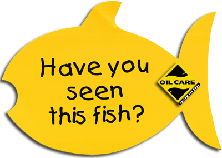
The
Scottish Yellow
Fish Project "is an active, enjoyable
and effective way of raising awareness of the
issues of waste and pollution". The project
is part of the Scottish Oil Care Campaign, aimed
at promoting the responsible delivery, storage,
use and disposal of oil and oil related products.
In the Yellow Fish Project, volunteers identify
drains leading direct to burns and rivers and
mark them with a stencilled yellow fish. The objective
is to get message across: Dispose of your waste
responsibly, not down any drain!
Oil,
Water and Chocolate Mousse, presented by Environment Canada,
provides information on oil, oil spills, effects and responses,
means to prevent oil spills (what can I do to help?), &
an environmentally-friendly oil spill experiment to demonstrate
how difficult it actually is to clean up oil.
Discover
the world of oil and gas is the educational site of the
Australian Petroleum Production and Exploration Association.
Here one finds information and classroom resources for teachers
and students "to discover just what Australia’s petroleum
industry is all about."
Discover
Petroleum is an educational site provided by the British
Institute of Petroleum. On this site one finds general facts
about oil, a virtual tour of a refinery, games, etc.
Energy
Lessons, by the U.S. Department of Energy, gives information
on coal, oil, and gas (history, use, etc.) See, for example,
Looking down an oil well.
|
